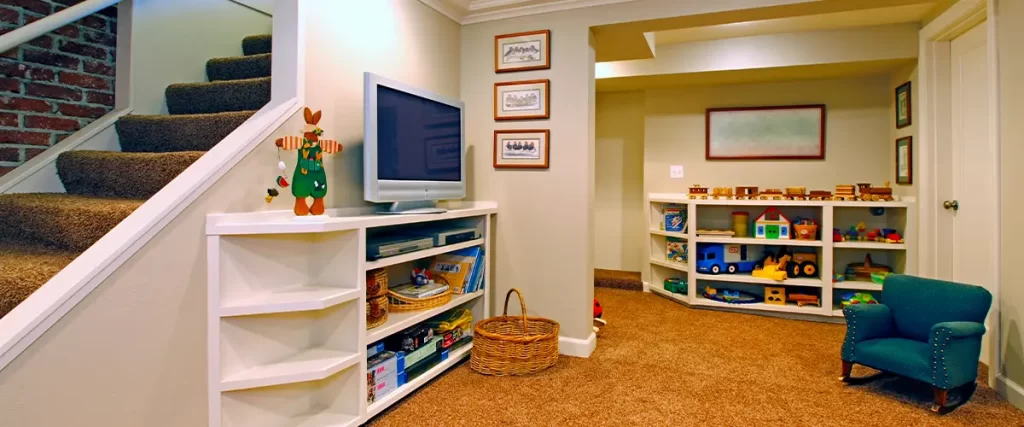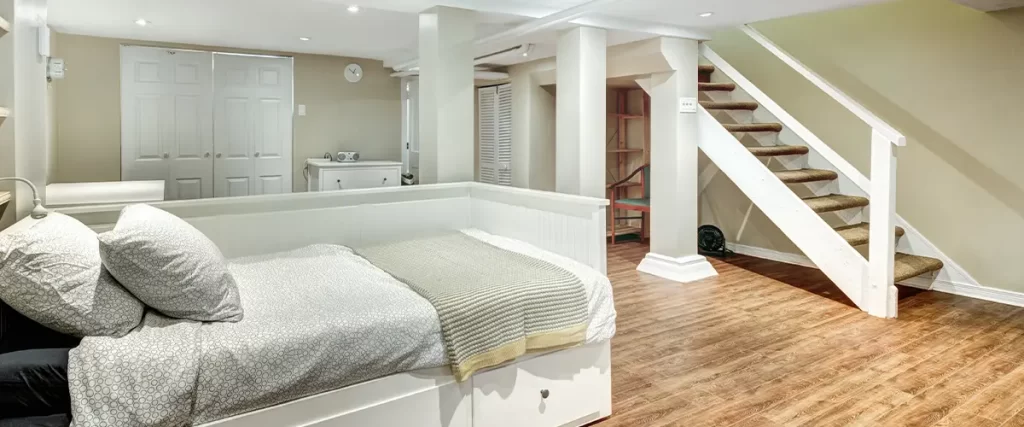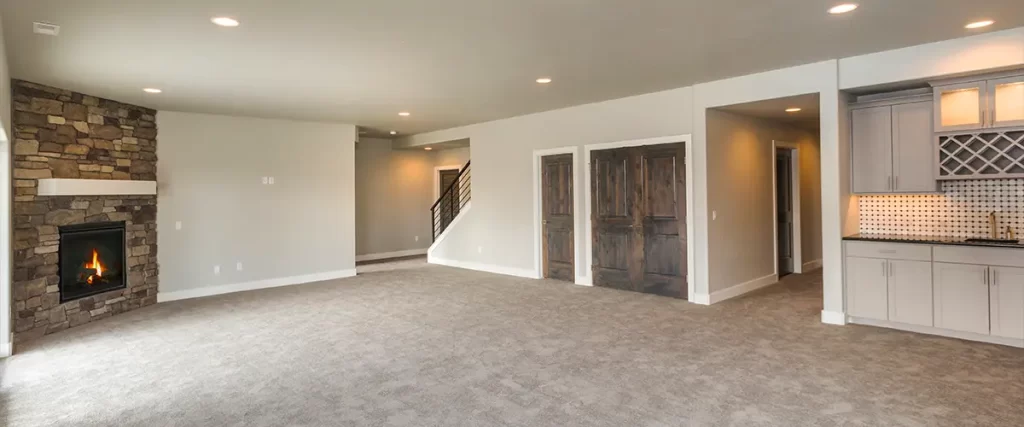If you’re thinking about finishing your basement in Anne Arundel County, the first question that probably comes to mind is: “Do I need permits for this?” The short answer? Probably. But the long answer is where things get interesting, and more importantly, where you avoid costly surprises.
Permits exist for good reason, and skipping them can lead to problems down the line.
So before you start putting up drywall or calling in a contractor, it’s worth taking a moment to understand what’s expected here locally.

When is a Permit Required to Finish a Basement?
In Anne Arundel County, permits are required for most basement finishing projects. That includes work involving:
- Electrical systems
- Plumbing
- HVAC installations or relocations
- Framing new walls
- Adding a bathroom or bedroom
- Creating new livable space
Any time your basement remodel impacts the structure, layout, or systems of the house, you’ll likely need approval from the local building department. Even if you’re just finishing a previously unfinished space, it’s not something you can just start without paperwork.
One area that gets overlooked often is egress. If your plans include adding a bedroom, you’ll need a proper egress window, not just for code compliance, but for safety.
The Role of Local Building Codes and Inspections
Anne Arundel County follows its own version of the International Residential Code (IRC), and the permit process is designed to make sure every remodel complies with local building codes. This includes rules around ceiling heights, insulation, plumbing venting, and other details you might not think about until an inspector points them out.
Once you submit your detailed plans, they go through a plan review with the building and zoning department. You’ll also be dealing with required inspections throughout the process. Framing, rough-in electrical, HVAC, insulation, and final inspections are all common.
The point isn’t to make your life harder. It’s to make sure the space you’re building is safe, functional, and up to code. Skipping these steps can come back to bite you later, especially when it’s time to sell the home.
Common Mistakes Homeowners Make
Many homeowners think they can get around permitting by doing some work themselves or hiring a handyman under the radar. The thought process usually goes something like: “It’s just a basement, no one will notice.”
Here’s why that doesn’t work out well:
- Unpermitted work can lower property value.
- Insurance companies may deny coverage if something goes wrong in an area that was remodeled without permits.
- Future buyers might walk away or demand you pull retroactive permits, which can lead to more inspections and costs.
- You may be ordered to undo completed work if the building department finds out.
These are the kinds of situations we’ve actually seen with clients, usually after the fact.
What’s the Permit Process Actually Like?
It’s not impossible, but it’s not quick either. You’ll typically need to:
- Draw up your floor plan, including electrical, plumbing, and HVAC work.
- Submit two copies of your plans to the local building department.
- Pay the associated fees, which are usually calculated based on square footage and scope.
- Wait for the review and approval, which can take anywhere from a few days to several weeks, depending on complexity and how busy the office is.
- Schedule inspections at each phase of construction.
- Get final sign-off once the project is completed and passes inspection.
If it sounds like a lot of steps, it’s because it is. For smaller projects, like basic drywall and flooring, the permit might be quicker to obtain. But even then, it’s not optional if the work changes the livable layout of the home.

What If You’ve Already Started or Finished Without a Permit?
This happens more often than you’d think. Sometimes a homeowner buys a house with an unfinished basement, finishes it without checking regulations, then finds out later the work wasn’t permitted.
If that’s you, don’t panic, but don’t ignore it either.
Anne Arundel County does allow retroactive permits in some cases. You may need to uncover finished work so an inspector can confirm it meets code. There may also be fees or penalties involved. In extreme cases, you could receive a court order to undo the work.
This is where working with a licensed general contractor can help. They know how to navigate the permit application, work with the inspectors, and make sure everything is properly documented moving forward.
Who’s Responsible for Getting the Permit?
That depends. If you’re doing the work yourself, you’re the one who has to apply. If you hire a contractor, they should be the one to obtain permits and handle the entire process.
At Brucksch & Sons, we always handle permits on behalf of our clients. It’s one less thing for you to deal with, and it helps avoid mistakes that could delay the job or cost you money later on.
Also, keep in mind that even if a contractor says you “don’t need a permit,” you should always double-check with the local building department. Because if something goes wrong, you, not your contractor, will be held responsible as the homeowner.
What Will Permits Cost?
Fees are typically based on:
- The scope of work
- The square footage being remodeled
- Any structural changes
- Additional reviews needed (like for plumbing or electrical work)
There’s no flat rate because every house is different, and so is every project. But compared to the risk of unpermitted work, permit fees are well worth the cost.
Do All Finished Basements Require a Permit?
Almost all. The only exception might be cosmetic upgrades in a space that was already finished, like painting walls, replacing carpet, or swapping out a light fixture.
But if you’re finishing an unfinished basement, building new rooms, running plumbing, or doing electrical work, a permit is required.
If you’re not sure whether your project needs one, the first step is to call or visit the local building department office. They can walk you through the application process and inspection requirements specific to your area.
Is It Worth Doing All This Yourself?
That depends on your patience, your time, and your comfort with regulations, drawings, and inspections. Some homeowners enjoy managing their own remodeling projects. Others realize quickly that it’s more complicated than it seems.
Permits can be tricky. Regulations change. Inspectors catch things most homeowners wouldn’t think of. And it’s very easy to overlook one small thing in your floor plan or forget to schedule an inspection, only to face delays or redo work that was already completed.
If you’d rather avoid all of that and just focus on creating a beautiful, functional space, we’re here to help.

Leave the Permits (and the Headaches) to Us
Finishing a basement in Anne Arundel County, especially in Pasadena, can be a great way to add space and value to your home, but there’s a lot more to it than just drywall and paint. Permits, inspections, code requirements, applications… it adds up fast.
If you’d rather not spend your weekends digging through building codes and waiting in line at the zoning office, our team can handle the entire basement remodeling process for you.
Call us at (443) 261-9582 or message us here to talk about your project. We’ll make sure everything’s built the right way, handled professionally, and fully permitted, so all you have to do is enjoy your newly finished basement.
